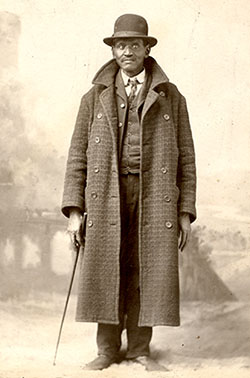Media (Books, Newspapers, Magazines, Radio)

Following on the widespread acclaim accorded the “plantation slave songs” performed by the Jubilee Singers, Fisk professor John Work II gave them academic form by publishing “Folk Songs of the American Negro" in 1907. In 1909, the Jubilee Quartet, organized by Work, and including himself, James Myers, Alfred King, and Noah Rider cut sides for the Victor Talking Machine Company. These early records helped to introduce the Negro spiritual into the mainstream of American music. In his The Book of American Negro Spirituals, published by Viking Press in 1925, future Fisk professor James Weldon Johnson compiled and published a major collection of spirituals. Thomas Talley, a professor of Biology at Fisk and another Tennessean, was also a collector of African American folk musical traditions. His book, Negro Folk Rhymes (1922), remains a basic text.
Those who founded vitally important African American newspapers, such as the Henry A. Boyd’s Nashville Globe and Randolph Miller’s Chattanooga Blade not only served local businesses by providing space for advertising but also joined readers to the national audience by disseminating news of vital interest.
A generation later, both white and black radio station owners and broadcasters added to this two-way flow by sending homegrown music out over the airwaves, launching careers for musicians whose talents might otherwise have remained unknown. Nashville’s WLAC was established by the Life and Casualty Insurance Company in 1926; it shaped mid-south musical tastes for over seventy years, especially from the mid-1940s to the early 1970s when nighttime programming on its AM station shifted to blues and rhythm-n-blues music, introducing whites to the sound and beat of black popular music. Gene Nobles began the tradition in the mid-1940s, playing songs requested by students attending Nashville's Fisk University and Tennessee State Agricultural & Industrial College (now Tennessee State University). WLAC's powerful signal of 50,000 watts carried the programming throughout most of the eastern United States.
Radio broadcasting’s wide reach was followed by entrepreneurial businessmen such as Randy Wood of Gallatin and Syd Nathan of Cincinnati. After Randy’s Record Mart became the nation’s largest mail-order record business, Wood founded Dot Records in 1950. Nathan, whose Syd’s Record Shop depended upon Kentucky’s Boone County Jamboree, which was broadcast over WLW, founded King Records in 1944. He hired African American composer and big band arranger Henry Glover as the A&R man for King Records, signing white and black musicians and producing country as well as other genres. Companies like Dot and King blended genres and marketed their records to as many separate audiences as possible.
In 1948-49 white-owned WDIA in Memphis became the nation's first all-black radio station. Its owners, Bert Ferguson and John R. Pepper, hired Nat D. Williams, the first publicly identified black disc jockey. WDIA, which soon grew to a 50,000-watt station, gave exposure to many local talents, including B. B. King and Rufus Thomas who worked as disc jockeys and local gospel groups like the Spirit of Memphis and the Southern Wonders. Bobby Blue Bland, Johnny Ace, and Roscoe Gordon even cut some of their first records in the WDIA studio. WDIA's Teen-Town singer program recognized the talents of Carla Thomas and Isaac Hayes.
Interactive Map
Discovering African American Communities in the Nashville Globe
Related Content